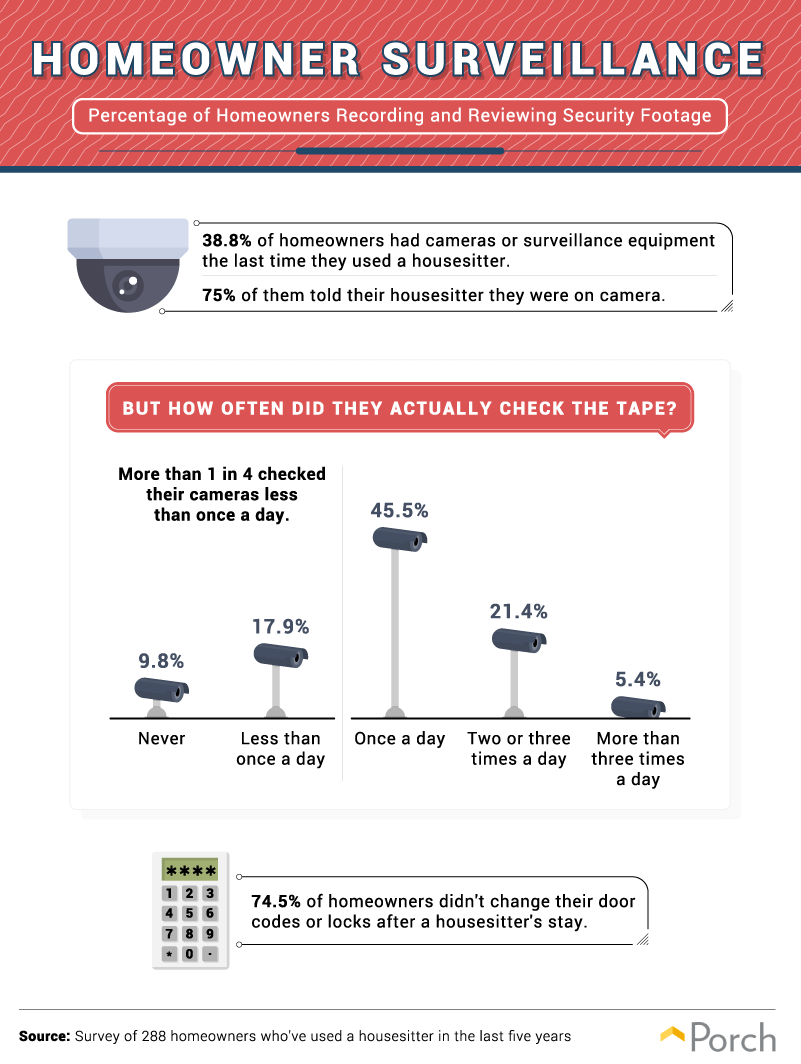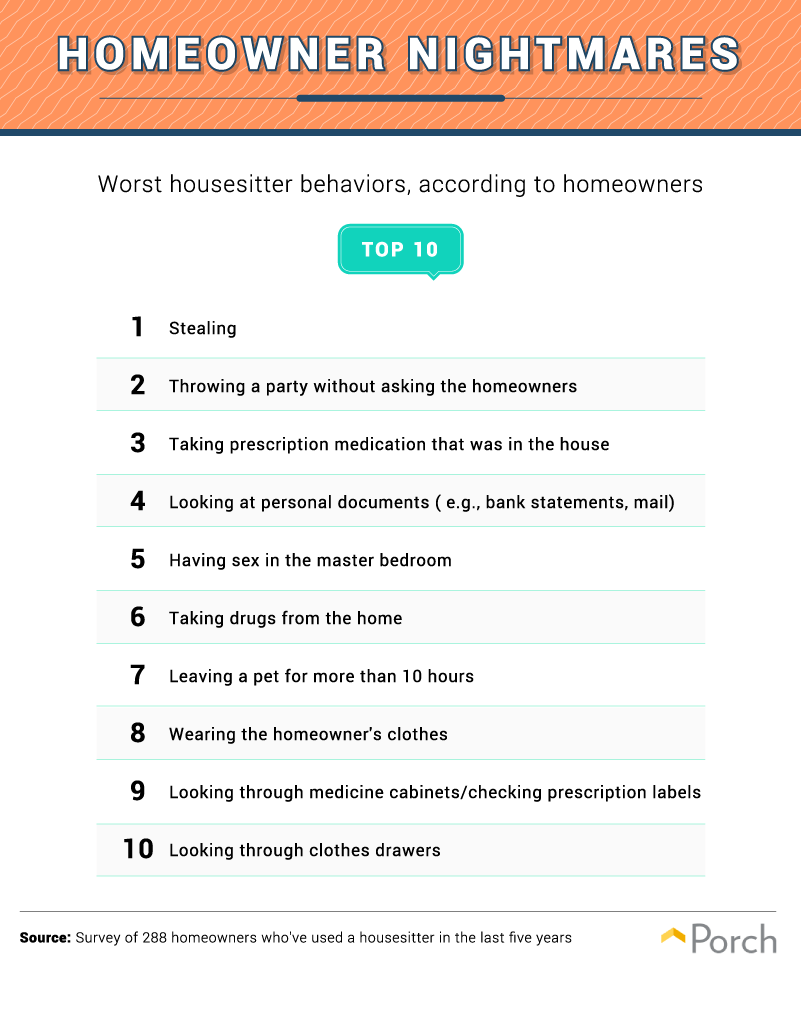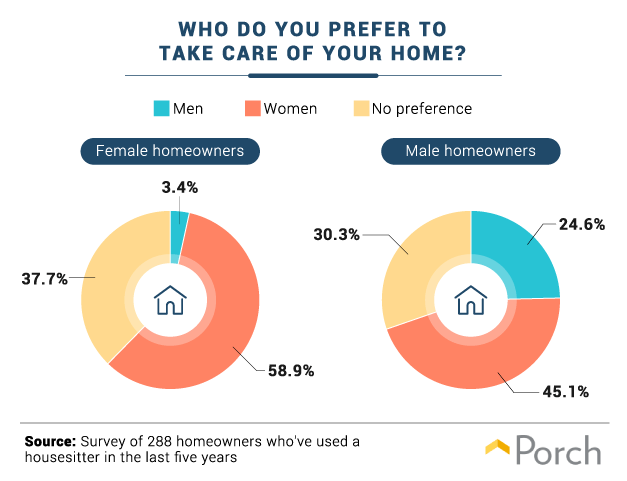Traveling can be stressful. From delayed departures to “what will I do with the dog” questions, the stress of leaving your home for an extended period can often outweigh the benefits of the trip itself. But if there’s anything that experienced travelers know, it’s that having a reliable housesitter can lessen your anxiety.
While it’s hard to enjoy your time away if you’re afraid of what’s happening at your home when you’re not there, if you have the right housesitter, you have nothing to worry about. But how many housesitters are actually doing what you hired them for, and how many are misusing your home while you’re away?
To understand housesitter habits better, we sought to uncover the top confessions from people who watch over our homes. In a survey of over 1,000 people who identified as either housesitters or homeowners who had used housesitters, we determined that the people we put our faith in to watch over our home may be betraying us behind closed doors. Read on to learn the details of our discoveries.
Housesitter admissions

Some of those who admitted to invasive behavior while housesitting had regrets, shame, or other apprehensions about their actions: In fact, over 30 percent of respondents concealed less-than-ethical habits from the people for whom they housesat. And whether it was due to curiosity or the desire to snoop, housesitters confessed to risky and even sometimes lewd conduct.
Watching over a loved one’s or client’s home requires a certain level of personal responsibility, including respecting their space and not breaching their right to privacy. This means not going through drawers, cabinets, alcohol bars, or pantries without asking, which many of our survey respondents confessed to doing. Over 1 in 3 people surveyed even admitted to eating the homeowner’s food without asking, so homeowners should make it clear what is off-limits.

An arguably bigger issue occurs when these admissions involve real security issues, however. About 1 in 4 respondents had invited a person over to the homeowner’s property without asking. Worse, over 7 percent of respondents admitted to throwing a party at the homeowner’s residence while housesitting.
The key point here: Only allow the most trusted sources or loved ones to take care of your home.
Caught on tape

If your home is outfitted with a security system, you can choose to disclose that information to your housesitter or keep it private. One in 10 housesitters said they were not informed of cameras and other surveillance gear prior to finding the equipment, revealing homeowners’ reluctance to leave their houses completely unguarded.
Hidden camera laws vary by state, but you have the right to use cameras on your property as long as you aren’t listing it with a homestay service such as Airbnb. In those instances, limitations do apply. As 21.7 percent of housesitters reported searching for hidden cameras in the past, it would be wise for homeowners to open up the lines of communication around surveillance.
Transparency is important here. If you do have cameras, talk to your homesitter and explain your reasons for ongoing surveillance. You can even choose to disable certain functions (such as a bedroom camera) to adapt to your housesitter’s comfort level. Finding a balance that respects both parties is key, but cameras can’t do their job if they are disabled.
Check your cameras daily

With more and more people getting home security systems, the demand to invest in home security can be high. However, it’s meaningless if the tapes aren’t checked. In fact, many respondents (45.5 percent) checked their cameras daily.
We also found that nearly 39 percent of respondents opted to use cameras or surveillance equipment in conjunction with a housesitter.
However, a significant portion of respondents neglected their systems more often than they should: Over 1 in 4 respondents checked their cameras less than once per day.
In general, housesitters should err on the side of caution and be on their best behavior, or else they may end up the focus of someone’s homesitter horror story.
Worst-case scenarios

We asked homeowners which conduct would top their list of unforgivable housesitter offenses and found that theft, followed by throwing a party and taking prescription drugs, would make them the most upset. These represent egregious violations of the homeowner’s trust and can be criminally enforced.
Housesitters should approach their profession with the level of seriousness it deserves. The top grievances that respondents reported are all worthy of intervention and action. Wearing someone else’s clothes or taking drugs from the home indicates bigger problems than an inability to control oneself.

In some cases, housesitter characteristics can impact a homeowner’s perception of safety; however, this may have no real bearing and can be more prejudicial than anything.
Tips for homeowners and housesitters

Homeowners ought to vet all potential housesitters properly and thoroughly. When seeking someone to take care of your home and everything it contains, start with a friend, family member, or referred sitter from a trusted app.
And always ensure that your cameras are rolling. They do no good if they’re disabled.
However, when a housesitter violates your privacy and crosses a boundary, it’s tough to start that conversation. Alerting them that you have observed inappropriate behavior can help, but if the problem is more serious such as theft or another crime, it may be time to call the authorities.
For housesitters, remember that someone is inviting you into their home. Housesitting can be a viable employment option for those looking for a flexible way to make a living, but it requires respect for homeowners.
The best time to start thinking about your safety and security is now. When looking for comparisons on the best home security systems, seeking professional installation help, or simply looking for information on home renovation projects, head over to Porch and read up on the latest in property protection.
Methodology and limitations
To compile the data shown above, we surveyed 1,001 people about their experiences housesitting or using housesitters. To qualify for the survey, respondents either had to have housesat in the last five years or used a housesitter in the last five years. 965 of the respondents had housesat in the last five years, while 288 used a housesitter in last five years. Because we were asking people to remember events that happened in the past, their answers may have been biased by common issues found in any survey. Generally, unless a respondent’s answers were inconsistent, we took respondents’ answers at face value.
Fair use statement
Know someone who’s planning on leaving town? We encourage you to share any of the graphics or information above as long as it’s for noncommercial use. We ask only that you cite the authors and link back to this page when you do.

